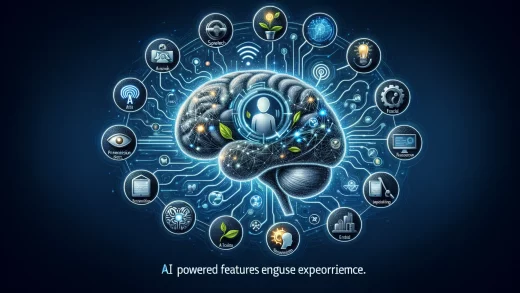Introduction to AI Frameworks for Mobile Apps
Picture this: You’re holding your smartphone, exploring a seamless app that seems to know what you want before you even tap. That’s the magic of incorporating AI frameworks into mobile app development. These frameworks are like the secret ingredients powering intelligent features – from personalized recommendations to jaw-dropping image recognition.
Why AI Frameworks Are Game-Changers for Developers
If you’re a developer, you already know the stakes are high. Users demand apps that don’t just work but think. AI frameworks are your backstage pass to creating apps that truly “wow” people. The right framework can do some heavy lifting for you, like:
- Enabling natural language understanding for chatbots and virtual assistants.
- Supercharging real-time image or voice processing.
- Seamlessly integrating predictive analytics to boost user engagement.
Think about it: Instead of reinventing the wheel, these frameworks let you plug into powerful, pre-built tools. It’s like upgrading from riding a bicycle to driving a Tesla. With platforms like TensorFlow Lite or Core ML, even small teams can build apps that feel cutting-edge.
What Makes Mobile AI Development Unique?
Mobile AI isn’t just desktop AI shrunk into pocket-size. Smartphones come with their quirks – limited battery, inconsistent internet, and hardware constraints. That’s why mobile-friendly frameworks are designed to handle it all, optimizing for low-power modes while maxing out efficiency. They help apps think smart and move fast.
The world of mobile AI frameworks is dynamic, full of hidden gems waiting to unleash creativity. Dive in, and watch your app ideas transform into life-changing user experiences!
Key Features to Look for in AI Frameworks

Flexibility and Customization Matter
When choosing an AI framework, think of it like picking out your dream toolkit. You need something that’s not only powerful but also adaptable to your unique vision. Look for frameworks that let you tweak, build, and fine-tune models to your heart’s content. For instance, does it allow seamless integration with your mobile app? Can you adjust algorithms without needing a Ph.D. in machine learning?
One standout feature to keep an eye on is modular design. This gives you the freedom to add or remove components without breaking a sweat. Imagine customizing a pizza—extra cheese, fewer toppings—it’s all about making it your own!
User-Friendly Features for Smooth Development
Let’s face it: developing AI-driven mobile apps can get overwhelming. That’s why the right framework should feel like your co-pilot, guiding you along the way. Prioritize tools packed with:
- Pre-trained models: Save time by starting with ready-to-go solutions.
- Intuitive APIs: These make coding feel less like rocket science and more like clicking LEGOs into place.
- Cross-platform support: Whether it’s iOS or Android, your framework shouldn’t play favorites.
Remember, the ideal framework isn’t just about horsepower; it’s about elevating your creativity while simplifying the bumps in the road!
Top 5 AI Frameworks for Mobile Development

Mobile AI Frameworks Changing the Game
It’s an exciting time to be a mobile app developer, isn’t it? AI frameworks have revolutionized the landscape, making it easier than ever to build apps that wow users with intelligence, personalization, and responsiveness. Here are the top five frameworks that developers swear by. Let’s dive in!
- TensorFlow Lite: Picture this—a lightweight version of the mighty TensorFlow, crafted for on-device machine learning. It’s fast, customizable, and ideal for apps demanding real-time predictions. Think: language translation or even image recognition at lightning speed!
- Core ML: Designed specifically for iOS developers, Apple’s Core ML is like your Swiss Army knife for AI development. Need to enhance Siri-like interactions? Or add AR magic to your app? This framework delivers seamless performance.
- Pytorch Mobile: The perfect companion for developers looking for flexibility. PyTorch Mobile combines efficiency with versatility, enabling dynamic neural networks that feel almost alive in your hands.
- Microsoft Cognitive Toolkit (CNTK): Big on capabilities, yet beginner-friendly. Whether you’re building voice-driven assistants or analyzing user behavior, CNTK brings Microsoft’s A-game to mobile AI.
- ML Kit by Firebase: Straightforward and powerful, it’s like the friendly neighbor of AI tools. From barcode scanning to text recognition, ML Kit makes integration refreshingly simple.
So, what’s your pick? These frameworks promise not just functional apps but experiences your users won’t forget.
Comparing the Leading AI Frameworks

Diving into the Strengths of Top AI Frameworks
Picking the right AI framework isn’t just a technical decision—it’s like choosing the perfect tool for an artist. Each framework has its own flair, and understanding their core differences can save you hours in development time.
To make it easier to grasp, let’s break down how these frameworks shine:
- TensorFlow Lite: A workhorse for mobile apps. Think of it as the Swiss Army knife of AI frameworks—versatile, efficient, and backed by Google’s muscle.
- PyTorch Mobile: The cool, flexible one in the group. If experimentation and quick tweaks are your style, you’ll love PyTorch’s dynamic nature.
- Core ML: Apple’s secret ingredient for seamless iOS integration. It’s as if they tailor-made it to speak your app’s language natively.
Performance vs. Ease of Use: Finding the Balance
Your choice ultimately boils down to what you’re solving for. Need lightning-fast performance? Go with ONNX Runtime. Want the easiest learning curve? Try Flutter ML Kit, designed for developers who don’t want to spend months mastering machine learning.
Think of it this way: Are you building a complex, high-precision model, or do you need something that “just works” out of the box? Balancing these factors is key.
How to Choose the Right Framework for Your Needs

Pinpoint Your Project’s Unique DNA
Choosing the perfect AI framework is like picking the right tool from a treasure chest—every piece has its own magic. But which one aligns with your vision? Start by diving deep into the heart of your project. Are you building a sleek, data-driven app that predicts user behavior? Or are you creating a visually rich experience powered by machine learning algorithms?
Consider what sets your app apart: Does it need to process massive data in real time? Then frameworks like TensorFlow Lite might be your dream match. On the other hand, if your app thrives on smooth integrations and simplicity, Core ML could be the unsung hero waiting in the wings.
Questions to Fine-Tune Your Choice
Before making any final calls, ask yourself these guiding questions:
- How user-friendly is it? Can newcomers grasp it, or does it demand advanced skills?
- Does it play nice with your platform? For Android, PyTorch Mobile shines, while iOS developers may lean toward Core ML.
- What’s the community like? A strong support network can save your sanity during crunch time.
Remember, the “right” framework isn’t just about flashy features. It’s the one that listens to your app’s story and amplifies its voice.



